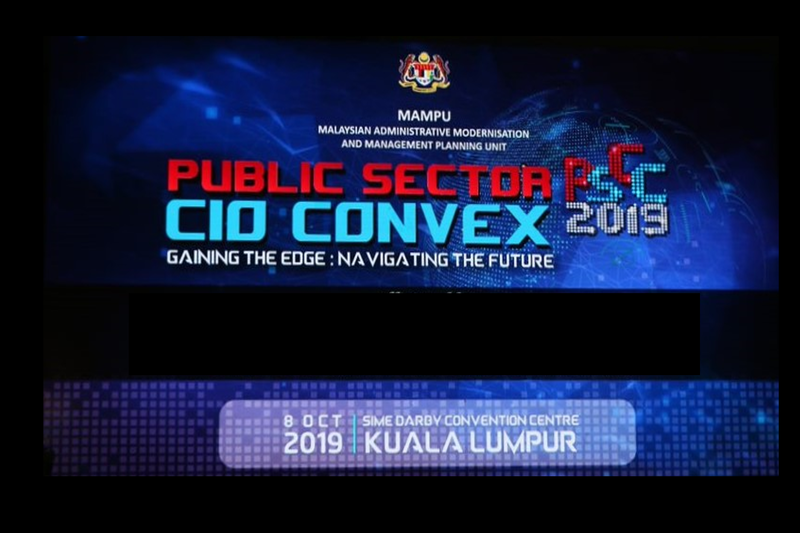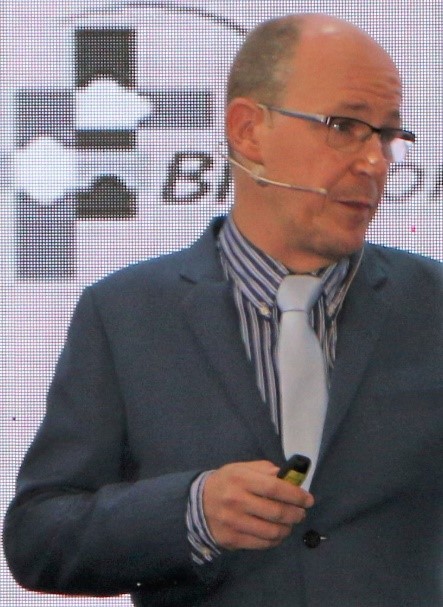
The Public Sector CIO Convex 2019 – Gaining the edge: Navigating the future was held from 8-9 October at the Sime Darby Convention Centre, Kuala Lumpur.
The event saw the Malaysian Administrative Modernisation and Planning Unit (MAMPU) and OpenGov collaborating for the fourth time on a two-day event which featured a series of case study presentations and panel discussions on several areas of technology.
Panel discussion 2 – Digital DNA: Navigate Towards North Star
 This panel discussion which delved into understanding the importance of adopting and experimenting with technologies was moderated by Mohit Sagar.
This panel discussion which delved into understanding the importance of adopting and experimenting with technologies was moderated by Mohit Sagar.
The panellists include Matthew Schultz, President at Australian Smart Communities Association, May Lit Mei Wan Associate Director, Learning Systems and Technologies Division at Singapore Management University, Nikhil Dwarakanath, Head of Analytics at Grab Holdings Inc. Singapore, and Abdul Halim Md Lassim, Executive Vice President at HeiTech Padu Berhad, Malaysia.
On what “Digital DNA” is Matthew said that it refers to the intrinsic values and culture of people towards adopting technology. May gave her definition for it to be the unlearning of the old and relearning of the new.
Nikhil said that it is about processes being faster and easier for customers. Abdul Halim said that it is about creating the environment for experimenting and adopting technologies.
Matthew acknowledged the concerns about the risks of spending large amounts of money to adopt technologies. He explained that the likelihood of risks to occur is low and there should be more of a pragmatic thinking of what can be achieved instead.
Having a similar mindset, May said that it is important to have the courage to try something new and make mistakes.
Nikhil said that the culture of experimentation is changing. An experimentation platform for quick testing should be created where technology is to be leveraged upon for experiments to run effectively.
Halim shared on Penang’s use of digital parking, where users are asked for their feedback on the system for improving its services and providing better results.
Mohit posed the question: How governments are to learn from this?
“Fail fast, get-up and move on,” said Nikhil. He said that there should be a push for the culture of experimentation.
Abdul Halim said that technology is about making mistakes, so long it is not done twice.
Mohit concluded the session by stating that being agile-fall is the trend. Governments have tremendous amounts of legacy systems and they should start looking at areas to innovate and build capability through that.
Technology case study 4 – Government Transformation through an Information led Future
 Lee Hann, Product Sales Specialist at Cisco Malaysia shared on how data centres are fundamental to digital transformation.
Lee Hann, Product Sales Specialist at Cisco Malaysia shared on how data centres are fundamental to digital transformation.
He started off by establishing that with applications being hyper-diverse and hyper-distributed today, data centres no longer exist as a fixed location. “Data centres are wherever data is created, processed and used,” he said.
But with how applications are becoming simpler for consumers, IT operations are becoming more complex. As a result, data centres must function such that they deliver with no error and have no downtime to support these innovations.
Lee touched on the 3 trends which are driving data centre modernisation: applications are evolving, workloads are more distributed, and developers demand multicloud flexibility.
As such, he said that data centres need to go wherever the data is.
He also shared on Cisco’s Data Centre and of how they achieve the best outcomes. He said that their three pillars of success include automation of their centre wherever possible, using a multi-cloud function so that it is not location-dependent, and integrating security ground-up.
Technology case study 5 – Government Transformation through an Information led Future

Shashwath Hedge, Solutions, Architect Team Lead at Asia Pacific Countries (APAC) FireEye, Singapore busted the 5 myths surrounding cloud technology.
Myth 1: Cloud is unsafe
He said that default cloud services are inherently more secure than anything server-based. There is yet to be an encounter of a truly “hacked” cloud service.
Myth 2: My organisation does not use cloud
Shashwath said that organisations are more than often using cloud and that viability to Saas applications is the first step towards cloud security.
Myth 3: My cloud provider will keep me secure
He said that while cloud providers operate under shared responsibility models in which they secure the base platform, it is also the responsibility of the customer for the ultimate safeguarding of data and assets.
Myth 4: The cloud is just someone else’s computer
He said that this is a misunderstanding as in fact hundreds to thousands of computers are used to perform a single request. Modern cloud means distributed apps, microservices, and API’s.
Myth 5: Advanced adversaries aren’t attacking cloud
He stressed that attackers follow data and hence it is imperative to have security measures prepared.
Keynote presentation 2 – Burning the Register: Setting up Data-Smart Coalition

Roeland Van Zeijst, Former Digital Crime Officer at Interpol, Netherlands presented on how digital services are to be rolled out.
He said that digital services should be: Glocalised (global positioning being fine-tuned to what is needed locally), citizen-centric, timely, directed, and secure.
Roeland mentioned the General Data Protection Regulation (GDPR), a regulation in EU law for data protection and privacy for all individual citizens of the European Union and the European Economic Area and attributed it to how the security of data is a priority today.
He shared that banks in the Netherlands have people on board for comparing cases and identifying threats on data breaches. The sharing of data between banks has allowed them to fight cyber-attacks more efficiently. This is an example of creating secure digital services.
He also shared on the online platform: www.nomoreransom.org as an example of a glocalised digital service. It is a dedicated site for fighting ransomware related cybercrimes. This project sees various law enforcement and IT security companies come together on one digital location for achieving this cause.
Keynote presentation 3 – Mission Impossible?

Martyn Wallace, Chief Digital Officer of the Scottish Local Government presented a case study on Scotland’s journey to digital transformation.
One of the most important steps to be taken is for building transformation around the user through understanding the customer’s needs.
He shared on the Scottish approach to service design which is “designing the right thing and designing the thing right”. It is important to understand the problem and landscape before solving it.
Digitalisation in the Scottish local government is growing to be more outcome centric. Services are being redesigned while using technologies such as AI, IoT and Big Data to achieve better outcomes.
Martyn gave an overview on how the Scottish local government embarked on its digitalisation journey. Encompassing contributors such as community and partners while understanding how the transformation journey is to change over the course of time, the journey created outcomes such as more efficiency, better outcomes, partnership working, redesigning services around citizens, community empowerment and early intervention measures.
He concluded that the digital transformation journey should involve shaping, sharing, shifting, and scaling.
















